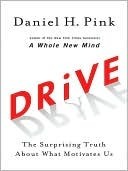More on this book
Community
Kindle Notes & Highlights
Read between
October 17, 2016 - February 4, 2021
“When money is used as an external reward for some activity, the subjects lose intrinsic interest for the activity,”
The way to improve performance, increase productivity, and encourage excellence is to reward the good and punish the bad.
Frederick Herzberg, a psychologist-turned-management professor, proposed that two key factors determined how people fared on the job. The first were “hygiene” factors—extrinsic rewards such as pay, working conditions, and job security. Their absence created dissatisfaction, but their presence didn’t lead to job satisfaction. The second were “motivators”—things like enjoyment of the work itself, genuine achievement, and personal growth.
Wikipedia represents the most powerful new business model of the twenty-first century: open source.
“Intrinsic motivation is conducive to creativity; controlling extrinsic motivation is detrimental to
In other words, the central tenets of Motivation 2.0 may actually impair performance of the heuristic, right-brain work on which modern economies depend.
adding certain kinds of extrinsic rewards on top of inherently interesting tasks can often dampen motivation and diminish performance.
As organizations flatten, companies need people who are self-motivated.
Routine, not-so-interesting jobs require direction; nonroutine, more interesting work depends on self-direction.
When he conducts job interviews, he tells prospective employees: “If you need me to motivate you, I probably don’t want to hire you.”
The best use of money as a motivator is to pay people enough to take the issue of money off the table.
Remember: When children didn’t expect a reward, receiving one had little impact on their intrinsic motivation. Only contingent rewards—if you do this, then you’ll get that—had the negative effect. Why? “If-then” rewards require people to forfeit some of their autonomy. Like the gentlemen driving carriages for money instead of fun, they’re no longer fully controlling their lives. And that can spring a hole in the bottom of their motivational bucket, draining an activity of its enjoyment.
“When institutions—families, schools, businesses, and athletic teams, for example—focus on the short-term and opt for controlling people’s behavior,” they do considerable long-term damage.
As one leading behavioral science textbook puts it, “People use rewards expecting to gain the benefit of increasing another person’s motivation and behavior, but in so doing, they often incur the unintentional and hidden cost of undermining that person’s intrinsic motivation toward the activity.”4
researchers wrote, “In eight of the nine tasks we examined across the three experiments, higher incentives led to worse performance.”
the solution isn’t algorithmic (following a set path) but heuristic (breaking from the path to discover a novel strategy).
Rewards, by their very nature, narrow our focus.


